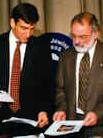
Convicted JDL terrorist Steven Rambam with York University historian Irving Abella promoting their Fifty-Confessions Hoax.
 Convicted JDL terrorist Steven Rambam with York University historian Irving Abella promoting their Fifty-Confessions Hoax. |
| 22 July 2002 |
In his 1989 Village Voice article, Oy Vey, Make My Day, Robert I. Friedman demonstrates that you are closely acquainted with Mordechai Levy, as is to be expected when the two of you have been maintaining a death grip on each other's throats for years:
But in the last few months, nothing has obsessed Levy more than his increasingly bitter feud with two rival Jewish militants � West Coast JDL boss Irv Rubin and convicted JDL terrorist Steven Rombom. [...] |
Rambam engaged in a public records investigation about Levy, and asserts that
Mordechai Levy owns real property in Los Angeles County, maintains post office box
No. 25764 in Los Angeles, operates a service station known as Motty�s Arco in Anaheim,
owes the Franchise Tax Board about $13,000 in taxes, and participated in other
California lawsuits as a plaintiff and defendant. Levy provided a declaration stating that
his own investigation revealed that there is a person known as Mordechai Motty Levy, a
native of Maryland, who moved to North Hollywood in 1992, and then moved to Los
Angeles in 1995, and maintains post office box No. 25764, along with an Andrina Levy,
probably his wife. Levy declared that he is not Mordechai Motty Levy, that a social
security number associated with Motty Levy is not his social security number, and that
Rambam was deliberately confusing Motty Levy with him; he has never heard of this
other Levy who is in no way connected with him. Levy also denied that he is married
and denied that he or the JDO invoked the benefits or protection of California law. [...] |
Mrs. Elsie Zimmerman's predicament started with her realization that desertion was not a basis for divorce in New York where she lived, but was in New Jersey, where she did not live. Her New Jersey lawyer attempted to resolve the predicament by giving her a New Jersey address. This deception ended with her and a witness of hers, "Merrick," pleading guilty to criminal contempt of court consisting of perjury, and with another witness of hers, "Thomas Rady," being tried and convicted of same. Of particular interest here is Mrs. Zimmerman's lawyer who also was summarily convicted of a contempt which in substance amounted to subornation of perjury, and who appealed his conviction before the Superior Court of New Jersey Appellate Division, which appeal is quoted from below.
Mrs. Zimmerman's lawyer is referred to here as the Anonymous Lawyer because he is never identified by name, but rather is variously referred to as the "appellant," or Mrs. Elsie Zimmerman's "attorney," or her "solicitor," and once as a "counsellor at law." The story of the Anonymous Lawyer of Very Good Reputation runs as follows:
Each of the witnesses for the State had either pleaded guilty or been convicted of a contempt which was in substance wilful perjury. While they were not thereby disqualified from testifying against appellant [Citations], the weight to be given their testimony was seriously impaired. Put against that the obvious interest that appellant had in denying the charge. |
Liars are disbelieved.
Both sides had convictions for perjury-related crimes.
A 1950 lawyer could not have been running a paperless office.
We realize that weaknesses in appellant's case, such as the odd fact that during the 15 month's period Mrs. Zimmerman's case was pending, he never communicated with her by mail; the curious tone of the letter he wrote her immediately after the hearing; the puzzle of the color of the ink with which she signed sundry papers. Yet, after a full consideration of these circumstances and of the entire case, we do not find that the evidence establishes the guilt of the appellant.
|
Recklessness toward uninvolved parties.
A deception with no chance of success.
A question of leniency.